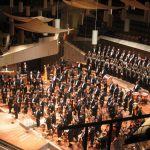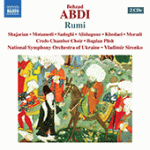The term “School of Vaziri” is often used in writings on Iranian music, but the exact meaning of the term is not clear; some of the authors have used the term to only refer to the group of Vaziri’s students, including a large group of his conservatory students and his Tar students such as Abolhassan Saba, Rouhollah Khaleghi, Ahmad Foroutan Rad, Hossein Sanjari, Heshmat Sanjari and others. But can we consider all Vaziri’s students as followers of his school of thought? This is definitely a mistake, because we know that some of Vaziri’s students have chosen a completely different path than that of Vaziri.
Tag Archives: alinaghi vaziri
Harmony in the Iranian Music (II)
One of his works was the translation of Harmony, which was carried out with the help of Mozayyan al-Dowleh, and included a pamphlet based on which he used to teach the subject to the students of the school of music; the pamphlet was never published. It was, in fact, a kind of simple harmony for the piano with no quadriads, it rather featured the engagement of both the right hand and the left hand which was being taught at the music school for the first time. Salar-Mo’azez also composed military marches and hymns for schools, which he harmonized to be performed and piano. Likewise, he used to compose for military orchestras.
Harmony in the Iranian Music (I)
Translated by Mahboube Khalvati The article you are about to read was written by Rouhollah Khaleqi (1906-1965), composer, and conductor of Golha Orchestra (established in 1956). Khaleqi was one of the most prominent promoters of polyphony for the Iranian music and is one of the best representatives of the school of Ali Naghi Vaziri. In…
Read More
Banan: the Artist of the Age
Gholam Hossein Banan was born in 1911 in Tehran. He was born in an affluent art-loving family who were Naser al-Din Shah Qajar (1848-1896)’s relative. The Qajar King was his mother’s uncle on her father’s side. He learnt his first lessons in music while his father sang Iranian avaz (improvised rhythmic-free singing), he then attended classes by the renowned Iranian composer, Morteza Neydavoud (1900-1990) along with his sisters; the composer is, therefore, considered as his first teacher. He then learnt Iranian avaz under the supervision of Mirza Taher Zia Resaee (Zia-o Zakerin) and Naser Seif in an oral manner.
Latest posts
- Transition to Enlightenment: Six Lectures on Mozart’s String Quartets (5)
- Nasser Masoudi: The Voice of Gilan and a Legacy of Iranian Music
- Farhad Poupel: The Voice of the Shahnameh in the Orchestras Around the World
- Five Major Myths About Mozart’s Life
- Bahma Rajabi Passed Away!
- Reza Vohdani; Unveiling unpublished works, preservation of Iranian classical music
- Ahmad Pejman Passed Away!
- Timeless or Timely: The Role of Historical Context in Defining Artistic Value
- Leading the Charge in Censorship
- The Legacy of Khosrow Jafarzadeh
- Transition to Enlightenment: Six Lectures on Mozart’s String Quartets (4)
- Fereydoun Shahbazian, An Iranian Musical Icon Passed Away
From Past Days…

Iranian Fallacies – Global Performance
One of the most important criteria for measuring the quality of a piece of classical music is number of times the piece has been performance by different ensembles and orchestras in different eras. This belief has become so pervasive in some societies, such as Iranian society, that it is considered the only criterion for measuring the quality of a piece of classical music.

Principles of Playing Violin (V)
3/1/2/5: When the first finger lands next to the nut, continuation of first phalange of this finger, on back of the hand, should be in line with continuation of the back of the wrist and the left hand; moreover, it should not pass them and bend at knuckles. Otherwise, an uncommon stretch is created in first finger’s knuckle also reducing the freedom of other fingers (especially the fourth finger) in finger placement.

Interview with Farhad Poupel (I)
Born in Isfahan, Iran, and based in the UK, Farhad Poupel’s music has been performed and will be performed in numerous prestigious concert halls and festivals throughout the world including Suntory Hall in Tokyo, Japan; La Roque-d’Anthéron Piano Festival, La Roque-d’Anthéron, France; Biarritz Festival, Biarritz, France; Stoller Hall, Manchester, UK; Janacek academy of music and performing art, Brno, Czech Republic; Karlskrona International Piano Festival, Karlskrona, Sweden; by distinguished artists such as Kotaro Fukuma, Peter Jablonski, Daniel Grimwood, Margaret Fingerhut, Catherine Carby, Kristýna Znamenáčková,Jeffrey Biegel, Jean-Francois Bouvery and orchestras such as Windsor Symphony Orchestra or broadcasted on the NPR Radio 4, Netherland. The following is an interview with him on the ocaasion of the premier of the Legend of Bijan and Manijeh.

Behzad Abdi’s opera Rumi was physically released by Naxos
Composing a traditional Iranian opera using the Iranian modal system, dastgāh, has always been my dream. I first approached this by composing an opera called Ashura followed by the operas Rumi and Hafez. I believe that in order to attract an international audience for Iranian opera, it is essential to fuse dastgāh with Western classical forms.

Payam Taghadossi: Talented Iranian-Austrian Cellist
Payam Taghadossi (born in 1989) started his musical education at the age of 4 years with Monika Scherbaum in Bregenz (Austria). At the Conservatory Feldkirch he joined the class of Imke Frank and Martin Merker. Later he studied in Zurich (Switzerland) with Thomas Grossenbacher and Christian Proske, where he 2011 graduated as a Bachelor of Arts in Music Performance. Two years later as the student of Rafael Rosenfeld he received his Master of Arts in Music Performance diploma and later graduated as a Master of Arts in spezialized Music Performance in 2016 from the Hochschule für Musik Basel FHNW.

Shaahin Mohajeri Wins UnTwelve Composition Competition
UnTwelve Non-profit Organization announced the results of its 2014/2015 composition competition on January 28, 2015. Shaahin Mohajeri, an Iranian Tonbak player, microtonalist, acoustician and composer, was awarded the second prize for his piece “Castle of Babak.”

Farshad Sanjari, Forgotten Iranian Conductor Met His Tragic End
Farshad Sanjari, one of the most renowned Iranian conductors in the 1970s in Iran died after fire broke in his apartment in Vienna on November 22, 2019. Farshad Sanjari was not involved in politics; however, he was one of the victims of the Iranian Islamic Revolution in 1979. After the victory of the Islamic Revolution, his name was never seen as the conductor of any programmes.

“The Art of Silence” Project Will be Released
Shaahin Mohajeri, the award-winning Iranian microtonal compose, has contributed to The Art of Silence is an international project which features unpublished pieces by microtonal composers from Iran, Japan, the United States, and other countries.

Principles of Violin Playing (VII)
4.3.1.3 Regarding the great linear distance and the unusual distance between the first and forth fingers, the first finger while playing the doubles of ninth and tenth interval, can be twisted in the knuckle area and the point mentioned in 3.1.2.5 paragraph in relation to the way first finger is placed indicating that the first joint of this finger in back of hand must be in line with the direction of forearm and left hand is not true here.

Developments in Iranian Music Since Qajar Era (II)
Santour:
Nine-bridge and twelve-bridge Sanours were both used until the early Pahlavi dynasty. However, as Faramarz Payvar devised new methods for playing the nine-bridge Sanour, this variety of the instrument which was hammered by felted sticks became popular.